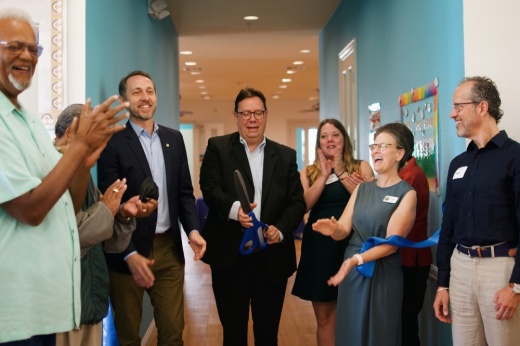What’s new?
Integral Care and Travis County officials celebrated Aug. 23 the opening of the county's first youth crisis respite center in the Mueller area within the SAFE Alliance headquarters, a nonprofit that provides shelter and services for victims of abuse.
Intended for young individuals, ages 13-17, the mental health program offers an alternative to psychiatric hospitalization, according to Marlene Buchanan, the director of systems of care at Integral Care. She said this service helps fill the need for intermediate care.
“There's a little bit of a stopgap [in youth mental health care] that we have in our community right now, because currently, we either have home with parents or we have hospitalization,” Buchanan said. “Right now, when a kid goes into crisis, they end up sitting in the hospital. Maybe there's a lower level of care that, if it was available, they could go to just take a break, everyone takes a breather, and then they work on reuniting with the family.”
This new, short-term alternative provides a less-restrictive option than hospitalization, offering 24/7 supervised support and safe space. Individuals can stay up to 10 days, with an average stay of five days expected, according to Integral Care.
The facility boasts 10 beds and provides on-site support from professional therapists and case managers. The program also offers family therapy sessions to support recovery and family reunification.
Buchanan said Integral Care hopes to serve up to 75 teens annually.

Integral Care received state funding from the Texas Department of Health and Human Services to cover the two-year pilot program.
While the program is the first of its kind in Travis County, a growing trend can be seen emerging among other Central Texas counties that have launched similar initiatives in recent years.
Referred to by Buchanan as one of the “trailblazers,” Williamson County, directly north of Travis County, launched its youth mental health respite program in 2022, with the help of the county’s mental health provider Bluebonnet Trails Community Services.
The county saw an overwhelming need for this service after initially establishing the program, which resulted in services and bed space being expanded in 2024.
Not only does the WilCo youth mental health program help to close the gap in needed care, but it also reduces youth interaction with the juvenile correctional system, according to an update at Williamson County Commissioners Court at the end of last year.
Williamson County Judge Angela Williams previously told Community Impact that there has been a noticeable increase in the number of individuals with mental health needs entering the justice system.
Williams explained that when hearing juvenile cases, usually truancy hearings, she often sees a lack of motivation to attend school stemming from various mental health issues, such as social anxiety.
The 16-bed, short-term residential facility provides wraparound services for children and adolescents ages 5 to 17. These services include therapy, care coordination, family services, psychiatric evaluation, medication management and case management.
The Williamson County program has also resulted in taxpayer cost savings. It is estimated the county saves thousands of dollars per individual per day by utilizing the youth mental health respite center:
- Residential treatment center beds diverted: $618
- Private psychiatric hospital beds diverted: $625
- Juvenile Justice Center beds diverted: $204 (pre-adjudication) $309 (post-adjudication)
Mental Health America data indicates Texas has consistently ranked among the worst states for mental health care.
When considering both youth and adult populations, Texas exhibits a higher prevalence of mental illness and lower rate of access to care, the data shows. Texas has the fifth-lowest number of mental health treatment centers in the nation, according to a recent study by Forbes.
Texas Health and Human Services lists Texas among the top four states with extensive mental health care personnel shortages.
A THHS behavioral health task force recent report confirmed that the behavioral health landscape tracks with national trends regarding an increased need for services and a shortage of providers.
More than 1.2 million, or roughly 20%, of all Texas youth—under the age of 17—have reported a mental, emotional, behavioral or developmental problem, according to advocacy group Every Texan.
“We're just really excited to be able to offer this. There's nothing like it in Travis County, and so we'll be the first,” Buchanan said. “Hopefully we'll be able to expand. The need is there, and it's just growing more and more.”
The organization hopes to expand the program in future years to support services for younger age groups, Buchanan said.

A report from Integral Care indicated that over 24,000 unique Travis County residents were served by the mental health provider in the last fiscal year, including 4,530 children and their families.
The location of the new youth respite center will support services and accessibility for a large portion of Integral Care clients, many of whom predominantly live along the I-35 corridor with one of the most densely served areas in North Austin.
Dell Children’s Medical Center, which includes a mental health unit offering pediatric mental health treatment, is also located nearby in the Mueller area. The hospital will be able to send referrals to the newly established Integral Care youth respite center for cases requiring lower levels of care.
Last year, Integral Care allocated $11.8 million to its child and family services budget, receiving a little more than $6 million from the state, accounting for over 50% of their total budget for child and family services.
For fiscal year 2024-25, the organization has earmarked $10.4 million for the child and family services division. The new mental health respite facility and program will cost just over $1 million annually to maintain and operate, which is being funded by the state for the two-year pilot program.
What parents should know
Parents can be proactive in their child’s mental health by knowing some of the signs and symptoms to watch out for, including:
- Problems with concentration, memory or ability to think clearly
- Changes in appetite
- Feeling sad, empty, hopeless or worthless
- Loss of interest in things that they used to enjoy
- Excessive worry
- Irritability or restlessness
- Changes in sleep
- Angry outbursts
- Not wanting to be around people or take part in activities
- Extreme panic
- Onset of new behaviors or rituals that are repeated
- Mood swings or frequent shifts in energy
- Changes in how they dress—if a child is wearing long pants and sleeves in hot weather, or hats all of a sudden, they could be hiding signs of self-injury





